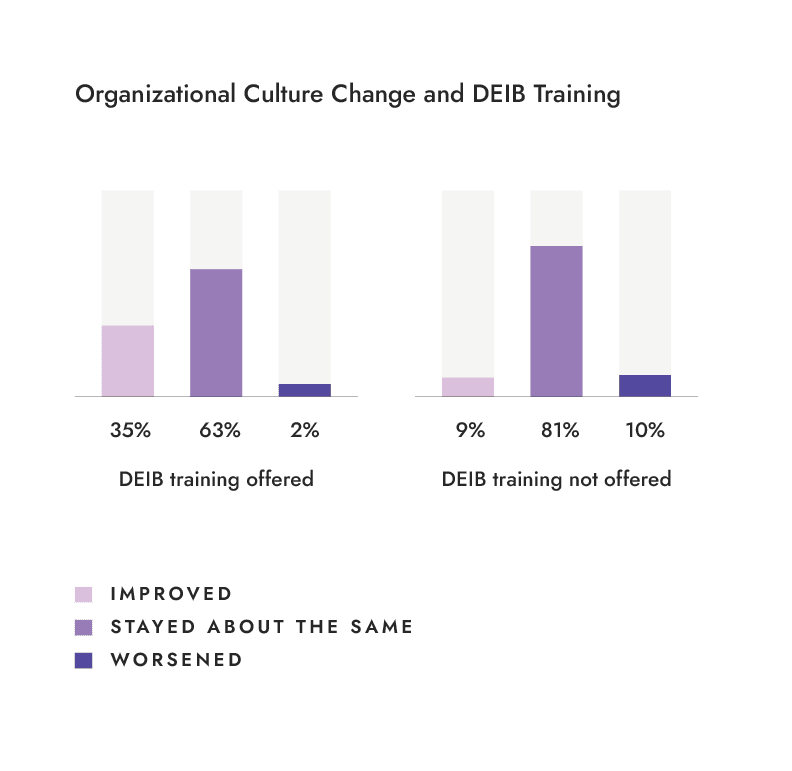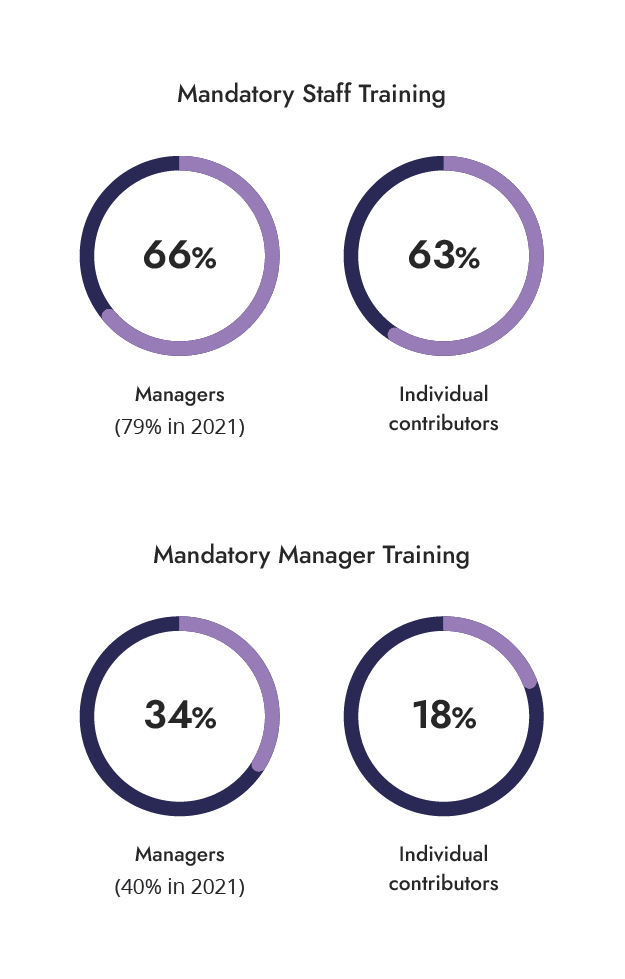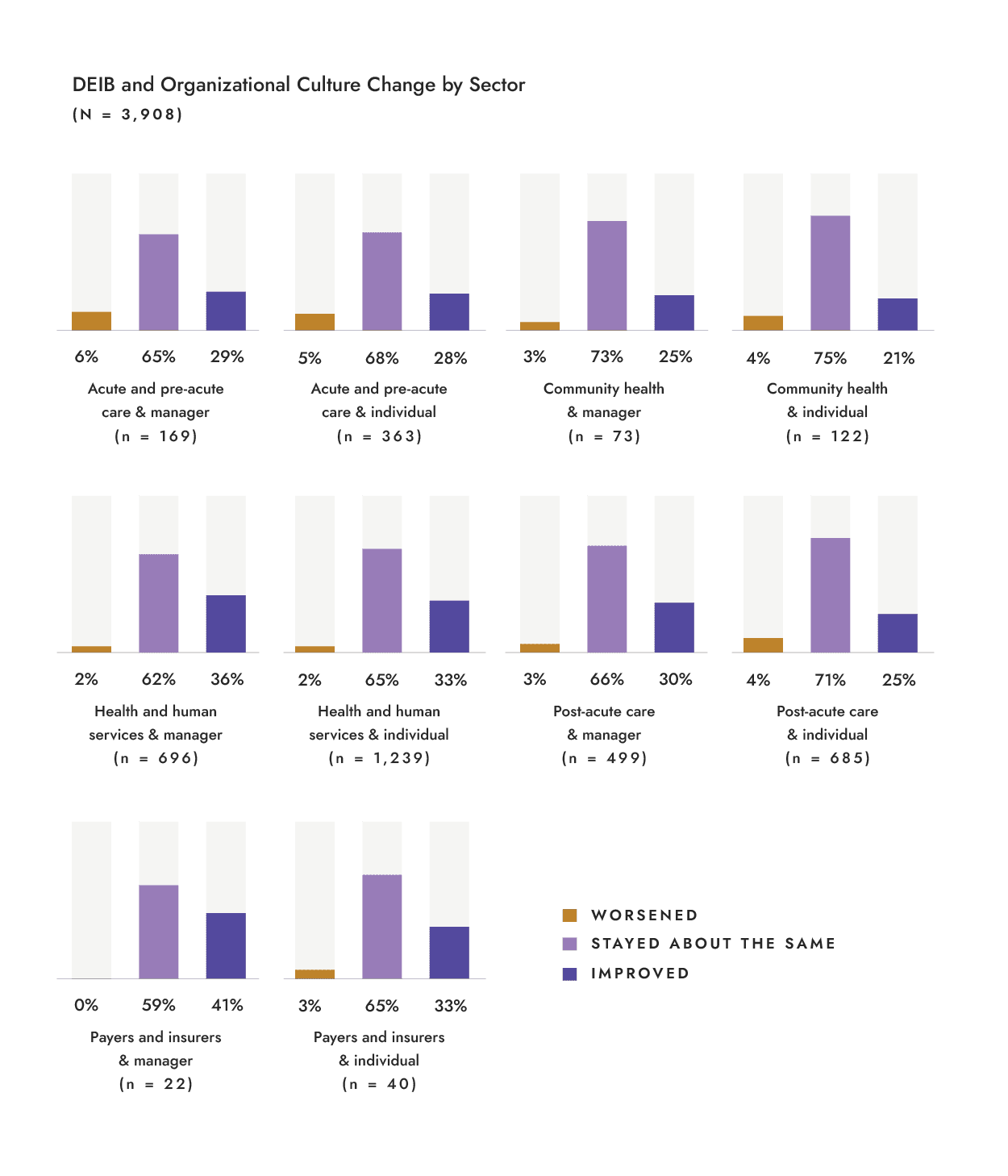Finding 2:
Looking at how diversity, equity, inclusion, and belonging (DEIB) affect the work culture, about a third of participants said their organization’s culture had improved in the last year (managers 33%, individual contributors 29%). Most said it had stayed about the same (managers 64%, individual contributors 68%), and only a small percentage said it had worsened (managers 3%, individual contributors 3%).
At a time when social issues, work environments, and healthcare outcomes continue to be linked, respondents provided encouraging impressions by indicating that their organizational cultures have progressed or are at least holding ground.
Relationship of DEIB training and culture
Our survey analysis found a significant relationship between organizations offering DEIB training and changes in their organization’s culture.

Respondents who said their organization offered DEIB training were more likely to say their culture improved over the last year (35%) than those whose organizations did not offer DEIB training and said their culture improved (9%).
Those who said their organization did not offer DEIB training were more likely to say their culture worsened over the last year (10%) than those whose organizations offered DEIB training and said their culture worsened (2%).
Respondents who said their organizations did not offer DEIB training were also more likely to say the culture stayed about the same (81%) than those whose organizations offered DEIB training (63%).
“With the current workforce crisis, many leaders have to contend with the reality that work culture improvements and opportunity for growth are major requirements to retain staff.
“For many healthcare workers, the two issues are inextricably linked. These findings reflect how DEIB can improve culture not only in terms of increasing communication and respect, but also in implementing policies that support the growth of all staff.”
Rola Aamar, PhD
who addresses behavioral health solutions at Relias
Prevalence of DEIB training
More than three-quarters of participants said their organization offers DEIB training for staff. That is up from 62% in our 2021 survey, which included only managers as respondents. Note that we changed the term in our 2023 survey to DEIB from diversity, equity, and inclusion (DEI) in 2021.
Note that a higher percentage of respondents who use a learning management platform or system (82%) said their organization offers DEIB training than those who don’t use such a system (61%). This data provides an opportunity for leaders to delve deeper into what actions they could take to support DEIB training in their organizations.
Our data shows a decrease in respondents who do not have DEIB training. In 2021, 19% of respondents said their organization did not participate in DEI initiatives. In our 2023 survey, only 15% of managers said their organization did not offer DEIB training.
In organizations that have DEIB training, staff participation was not always mandatory. The percentage of managers who said their organization mandated staff training in DEIB decreased since 2021.


All participants said mandatory manager training in DEIB was less common than mandated staff training. The percentage of leaders who noted mandatory manager training also decreased compared with the 2021 survey.
Although reports of mandatory training have decreased, the increased prevalence of DEIB training overall is encouraging.
Aspects of culture change
As seen in this finding, almost a third of participants said their organization’s culture had improved in the last year.
Of note, the hospital and health system (acute care) sector had the highest percentage of managers (6%) and individual contributors (5%) who said their culture had worsened over the last year. The percentages are small, however.
The health and human services sector had the highest percentage of managers (36%) and individual contributors (33%) who said their culture had improved.


If leaders are seeking specifics on how to improve their organizational cultures, insights from respondent comments may spark ideas. Many of the comments focused on enhanced diversity, education, awareness, and communication.
Highlights of How the Culture Improved
- Everyone aware and educated about what the standards are and how to treat one another
- Love seeing more people like me in my workspace — provides a sense of community
- Added trainings, promote growth for all
- Executive directors at our agency made clear how we are stronger with diversity
- Bring DEI issues to the forefront, improved conversations about it
- Better communication, more team atmosphere
- All staff informed about the intent to provide inclusive care and provided the tools to do so
- Accommodation of people with different ideas and cultures
- Having better underst relevant
- Expanded skills and training
- Added LGBTQ+ diversity classes
- Communication improved, and the shift to trauma-informed care improved employee policies
- Conversations more about culture and the use of the correct pronouns
- A lot more awareness and inclusivity
- Being kind and respectful
“These findings shine a light on a truth that proponents of DEIB have been promoting for years — that integrating DEIB initiatives helps leaders make more informed decisions about the needs and challenges of their organizations.
“And staff take notice and appreciate when these initiatives are put into place.”
Rola Aamar, PhD
Although the percentage who indicated their culture worsened is small, the comments that respondents shared about how their culture worsened could provide learning opportunities for leaders and staff. Communication and staff support issues frequently appeared in respondents’ comments.
Highlights of How the Culture Worsened
- Lack of support for staff and clients, not addressing needs around culture, and poor communication from leadership around making changes
- Organization not supporting staff when patients disrespect/refuse staff care based on ethnicity
- Workers not communicating with each other with problems they have with one another, causing disturbances in the working environment
- More and more shortage of staff
- Intolerance and bullying of individuals in minority groups
- Worsening culture from being told that we are not allowed to speak in our language
- Morale at an all-time low, and leadership not investing time or resources to change
- Bilingual staff members not feeling supported and therefore left
- Breakdown in communication
As the comments show, support and communication are key factors in creating a culture of trust.
“DEIB initiatives help staff members know that they are seen and cared for as whole individuals. In turn, this provides staff with the sense of safety to ask for what they need to succeed and grow.
“Ultimately, this means organizations that are a better culture fit for staff and staff that want to stay in their roles.”
Rola Aamar, PhD
Takeaway
Manager and employee education, ongoing conversations, and action on DEIB issues are important ways that leaders can support their employees in feeling a sense of belonging and promoting collaboration at work.






